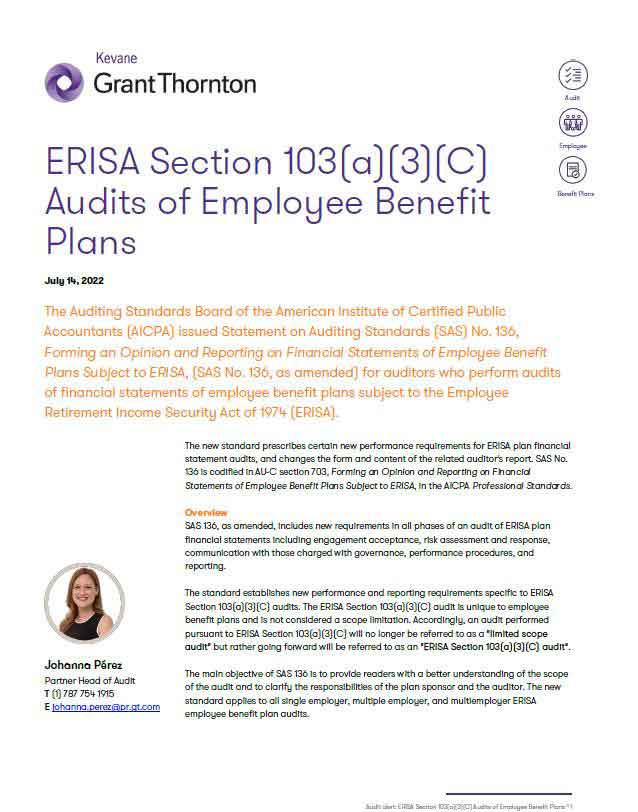-
Financial statements audits
Financial statement audits
-
Compliance audits
Compliance audits
-
Compilations and reviews
Compilations and audit
-
Agreed-upon procedures
Agreed-upon procedures
-
Corporate and business tax
Our trusted teams can prepare corporate tax files and ruling requests, support you with deferrals, accounting procedures and legitimate tax benefits.
-
International tax
Our teams have in-depth knowledge of the relationship between domestic and international tax laws.
-
Tax compliance
Business Tax
-
Individual taxes
Individual taxes
-
Estate and succession planning
Estate and succession planning
-
Global mobility services
Through our global organisation of member firms, we support both companies and individuals, providing insightful solutions to minimise the tax burden for both parties.
-
Sales and use tax and indirect taxes
SUT/ VAT & indirect taxes
-
Tax incentives program
Tax incentives program
-
Transfer Pricing Study
The laws surrounding transfer pricing are becoming ever more complex, as tax affairs of multinational companies are facing scrutiny from media, regulators and the public

-
Business consulting
Our business consulting services can help you improve your operational performance and productivity, adding value throughout your growth life cycle.
-
Forensic and investigative services
At Grant Thornton, we have a wealth of knowledge in forensic services and can support you with issues such as dispute resolution, fraud and insurance claims.
-
Fraud and investigations
The commercial landscape is changing fast. An ever more regulated environment means organizations today must adopt stringent governance and compliance processes. As business has become global, organizations need to adapt to deal with multi-jurisdictional investigations, litigation, and dispute resolution, address the threat of cyber-attack and at the same time protect the organization’s value.
-
Dispute resolutions
Our independent experts are experienced in advising on civil and criminal matters involving contract breaches, partnership disputes, auditor negligence, shareholder disputes and company valuations, disputes for corporates, the public sector and individuals. We act in all forms of dispute resolution, including litigation, arbitration, and mediation.
-
Business risk services
We can help you identify, understand and manage potential risks to safeguard your business and comply with regulatory requirements.
-
Internal audit
We work with our clients to assess their corporate level risk, identify areas of greatest risk and develop appropriate work plans and audit programs to mitigate these risks.
-
Service organization reports
As a service organization, you know how important it is to produce a report for your customers and their auditors that instills confidence and enhances their trust in your services. Grant Thornton Advisory professionals can help you determine which report(s) will satisfy your customers’ needs and provide relevant information to your customers and customers’ auditors that will be a business benefit to you.
-
Transactional advisory services
Transactions are significant events in the life of a business – a successful deal that can have a lasting impact on the future shape of the organizations involved. Because the stakes are high for both buyers and sellers, experience, determination and pragmatism are required to bring deals safely through to conclusion.
-
Mergers and acquisitions
Globalization and company growth ambitions are driving an increase in M&A activity worldwide as businesses look to establish a footprint in countries beyond their own. Even within their own regions, many businesses feel the pressure to acquire in order to establish a strategic presence in new markets, such as those being created by rapid technological innovation.
-
Valuations
We can support you throughout the transaction process – helping achieve the best possible outcome at the point of the transaction and in the longer term.
-
Recovery and reorganization
We provide a wide range of services to recovery and reorganisation professionals, companies and their stakeholders.
The new standard prescribes certain new performance requirements for ERISA plan financial statement audits, and changes the form and content of the related auditor's report. SAS No. 136 is codified in AU-C section 703, Forming an Opinion and Reporting on Financial Statements of Employee Benefit Plans Subject to ERISA, in the AICPA Professional Standards.
Overview
SAS 136, as amended, includes new requirements in all phases of an audit of ERISA plan financial statements including engagement acceptance, risk assessment and response, communication with those charged with governance, performance procedures, and reporting.
The standard establishes new performance and reporting requirements specific to ERISA Section 103(a)(3)(C) audits. The ERISA Section 103(a)(3)(C) audit is unique to employee benefit plans and is not considered a scope limitation. Accordingly, an audit performed pursuant to ERISA Section 103(a)(3)(C) will no longer be referred to as a "limited scope audit" but rather going forward will be referred to as an "ERISA Section 103(a)(3)(C) audit".
The main objective of SAS 136 is to provide readers with a better understanding of the scope of the audit and to clarify the responsibilities of the plan sponsor and the auditor. The new standard applies to all single employer, multiple employer, and multiemployer ERISA employee benefit plan audits.
What plan sponsors need to know
Changes to Audit Reports, Engagement Letters and Other Communications
SAS 136, as amended, clarifies the responsibilities of plan management and auditors. Certain of these responsibilities are now included in the auditor’s report, engagement letters and required communications, as follows:
- auditor’s responsibilities are now disclosed in the auditor’s report which include professional judgements, professional skepticism and the auditor’s communication with those charged with governance.
- the plan management must understand and acknowledge, in writing, its responsibility to maintain a plan instrument, administer the plan, maintain sufficient records for plan transactions and benefits, and their responsibility for the financial statements, which are now included in the engagement letter with their plan auditor.
- management’s responsibility for the assessment of going concern and the auditor’s responsibility over management’s assessment is also included in the auditor’s report, when applicable.
Changes to Audit Procedures and Documentation
SAS 136, as amended, implements changes that affect multiple aspects of an ERISA plan audit, including engagement acceptance, risk assessment and response, communication with those charged with governance, and performance procedures and reporting.
Some of the most notable changes include:
- if a plan sponsor elects an ERISA Section 103(a)(3)(C), formerly known as a limited scope audit, management must represent that this is permissible and that the qualified institution can certify the investment information.
- management must provide to the auditor a substantially complete Form 5500 draft before issuance of the auditor’s report.
- the auditor must communicate in writing reportable findings to those charged with governance.
Effective Date
SAS No. 136, as amended, is effective for audits of ERISA plan financial statements for periods ending on or after December 15, 2021, although earlier implementation is permitted.
Additional Resources
AICPA Employee Benefit Plan Audit Quality Center
2020 AICPA Audit and Accounting Guide, Employee Benefit Plans, provides additional information about AU-C section 703.
Statement on Auditing Standards No. 136, Forming an Opinion and Reporting on Financial Statements of Employee Benefit Plans Subject to ERISA, as amended, issued by the Auditing Standards Board
We are committed to keeping you up to date of all developments that may affect the way you do business in Puerto Rico. Please contact us for further assistance in relation to this or any other matter.


